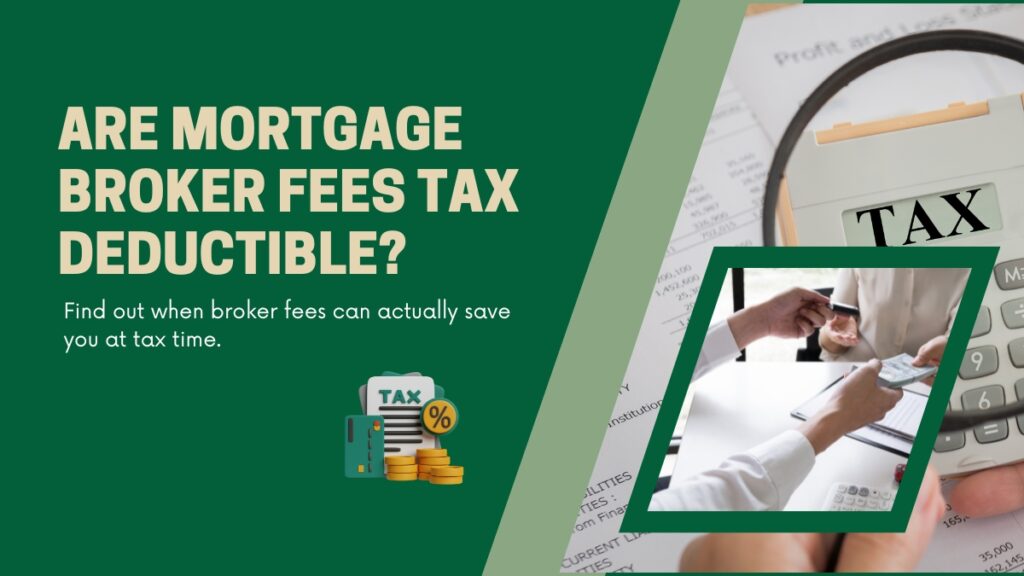In 2024, almost half of Canadian homebuyers turned to mortgage brokers to secure their financing. Broker fees range on average from 0.5% to 1.2% of the loan amount.
Many borrowers wonder if those fees are just an added cost or if they can reduce tax bills. Specifically, are mortgage broker fees tax deductible?
This article will explain mortgage broker fees, and it will also show how they may offset your taxes.
We will guide you through Canada Revenue Agency (CRA) rules and provide real-world examples so you can make informed decisions.
Our goal is to help you understand the fees you pay. We will explain when these fees become tax-deductible and how to document them.
First, we will define broker fees and their structure. Then, we will cover CRA guidelines for deductibility. Next, we will show you how to claim fees step by step.
We will also discuss special cases such as refinancing and HELOCs. We will warn you of common pitfalls, share case studies, and address provincial quirks.
Finally, we will explain when it makes sense to consult a professional. By the end, you will know when broker fees are a business cost and when they are personal expenses.
Understanding Mortgage Broker Fees
Confused about mortgage broker fees? Let’s break down what they are, how they work, and why understanding them could save you money!
What Are Mortgage Broker Fees?
Mortgage broker fees are the charges you pay for the service of matching your borrowing needs with the best lender options.
Typical components include origination fees charged for setting up the loan, application fees for processing paperwork, and service fees for ongoing support.
Brokers earn compensation either from the lender in the form of a finder’s fee or directly from you, the borrower, when dealing with private or subprime lenders.
In Canada, brokers work with multiple lenders to negotiate competitive rates and terms that you may not get on your own.
How Fees Are Structured?
Fees may be quoted as a flat fee, for example, a set amount such as $1,200, or as a percentage of the loan amount.
The most common model is a percentage commission of 0.5% to 1.2% of the mortgage amount, paid by the lender to the broker.
If the lender does not pay a commission, such as with private lending, the broker will charge the borrower directly, often around 1% of the loan value.
Fees can be paid at closing out of pocket or rolled into the mortgage balance, in which case you pay interest on those fees as part of your loan.
Ultimately, the cost is borne by the borrower whether paid upfront or amortized over time.
Are Mortgage Broker Fees Tax Deductible
Yes, mortgage broker fees can be tax deductible, but it depends on the situation. If the mortgage is for investment or business purposes, the fees may be deductible as a business expense.
However, if the mortgage is for personal use, the fees are typically not deductible. Always consult with a tax professional to understand how it applies to your specific case.
Tax Deductibility of Mortgage Broker Fees
Wondering if you can write off mortgage broker fees? Let’s dive into the tax rules and see when these fees could help reduce your tax bill!
CRA Guidelines
Under Canada Revenue Agency rules, fees related to obtaining financing for personal use of your primary home are considered personal expenses and are not tax-deductible.
The general rule is that only expenses incurred to earn income may be deducted. Thus, broker fees for a mortgage on your principal residence cannot be claimed on your tax return.
Self-Employed Individuals
If you are self-employed and you use mortgage financing to buy or improve a workspace, say, a home office that qualifies as your principal place of business, then related broker fees become a business expense.
Under CRA form T2125, you treat those fees as prepaid expenses and deduct them over five years at 20% per year.
You must clearly allocate the portion of your home used for business, based on square footage or time, and enter it on form T2125.
Investment Properties
When you borrow to purchase or renovate a rental property, broker fees are deductible against rental income.
On form T776, you include these fees under financing charges and deduct them over five years at 20% per year.
To support your claim, you need lease agreements, mortgage statements, and invoices labelled “mortgage arrangement fee.” Proper documentation ensures CRA accepts the deduction.
Claiming Fees on Your Tax Return
Not sure how to claim mortgage broker fees on your tax return? Let’s break it down and make the process simple so you can get the deductions you deserve!
Step-by-Step Claim Process
Gather Invoices and Mortgage Documents: Collect all receipts from your broker clearly indicating mortgage arrangement fees, plus statements showing loan purpose.
Allocate Portion Used for Income Generation: For mixed-use loans, calculate the percentage used for business or rental based on square footage or proceeds allocation.
Enter on the Appropriate Form: For rental property, use form T776 and enter financing fees under carrying charges. For business use, enter on form T2125 under interest and bank charges.
Amortize Over Five Years: Deduct 20% of total fees each year for five years, unless you repay the loan early, in which case deduct remaining fees immediately.
Record-Keeping Best Practices
Keep broker receipts labelled “mortgage arrangement fee” in a dedicated folder. Maintain separate files for personal and income-producing loans.
Retain lease agreements, statements, and CRA forms for at least six years in case of audit. A clear audit trail reduces risk and maximizes your allowable deductions.
Special Scenarios
Dealing with a unique situation? Let’s explore special scenarios where mortgage broker fees might be deductible and what you need to know!
Mortgage Refinancing
If you refinance your primary home purely for a lower rate or extended amortization, fees remain non-deductible.
However, if you refinance to extract equity for business or rental investment, prorate the fees by use percentage and amortize over five years.
Home Equity Lines of Credit (HELOC)
Outstanding HELOC balances hit $170.8 billion in September 2024, a 3% rise year over year.
Fees for arranging a HELOC are deductible only if the funds are used solely for business or rental property upgrades, and must be amortized over five years.
Major Renovations for Rental Units
When you use mortgage or HELOC financing to fund capital improvements on rental property, include broker fees in the capital cost allowance (CCA).
This increases your CCA pool and allows accelerated tax depreciation on the improvement costs.
Common Pitfalls to Avoid
Avoiding costly mistakes is key! Let’s look at common pitfalls when dealing with mortgage broker fees and how to steer clear of them.
Attempting to deduct fees on a principal residence. This will trigger CRA rejection since personal financing fees are non-deductible.
Misclassifying mixed-use loans without clear allocation. Always separate personal and income-producing portions.
Failing to document purpose. Without invoices and loan statements specifying business or rental use, CRA will disallow the deduction.
Case Studies
Curious how mortgage broker fees work in real-life situations? Let’s explore some case studies to see how deductions play out in different scenarios!
| Scenario | Fee Amount | Use | Deductible | Notes |
| Montreal rental mortgage | $1,200 | Rental property | Yes | Claimed on T776 |
| Calgary refinance primary home | $800 | Rate drop | No | Personal expense |
| Toronto freelancer HELOC | $1,500 | Business startup | Partially | Allocate by percent of use |
Provincial Variations
Rules can change depending on where you live. Here are some quick highlights:
British Columbia: After 2023, you can’t claim expenses for short-term rentals that aren’t properly licensed. If it’s not permitted, no deductions.
Québec: If you use part of your home as your main office, you can claim a share of mortgage interest and property taxes under Revenu Québec rules.
Ontario: Fees for investment properties can be written off. Personal home mortgage fees usually aren’t deductible.
Alberta: You can claim broker fees for rental properties as a business expense. Personal mortgage fees don’t qualify.
Nova Scotia: Just like most places, rental and business property fees are deductible, but personal home fees are not.
When to Consult a Tax Professional?
Unsure if you’re on the right track? Let’s look at when it’s time to consult a tax professional to make sure you’re handling mortgage broker fees correctly!
Mixed use properties: Allocating costs between personal living space and business use can get confusing
Cross border investing: Filing in Canada and another country means extra rules and forms
High audit risk: Large expense claims or unlicensed short term rentals can draw attention from the tax man
Complex mortgage setups: Multiple mortgages refinancing or tapping home equity for business use need careful handling
Unclear expense categories: Not sure if a fee is personal or business related A pro can help you sort it out
Recent tax law changes: Rules shift often A tax expert will know the latest and make sure you get every deduction you deserve
Conclusion
Ready to wrap it up? Let’s summarize what you need to know about mortgage broker fees and tax deductions so you can make the most of your options!
Key takeaway
Fees on mortgages for your personal home are not deductible. Fees on loans used to earn business or rental income may qualify, but must be properly allocated, documented, and amortized over five years.
Action steps
Track every broker fee, label receipts clearly, document purpose, and consider expert advice for complex portfolios.
Have questions? Get in touch with our mortgage experts or schedule a free consultation by calling (+1 844 354 3033).
Frequently Asked Questions
Can I deduct broker fees on a first-time home purchase?
No. Fees for financing your principal residence are personal expenses and not deductible under CRA rules.
Are stress-test or compliance fees deductible?
Only if those fees are part of financing used to earn income. Otherwise, they are personal and non-deductible.
What if my broker waived their fee for a referral?
A waived fee means you paid nothing, so there is no expense to deduct. If the lender still paid the broker commission, that does not create a borrower expense.
Additional Resources
Canada Revenue Agency’s guide on Business Use of Home Expenses
CMHC’s 2024 Mortgage Consumer Survey
Mortgage Professionals Canada’s broker directories and tax tips
Revenu Québec’s guide on Expenses Related to the Business Use of Your Home
With clear records and an understanding of CRA rules, you can ensure that every dollar of broker fee that qualifies for deduction works to your advantage.


